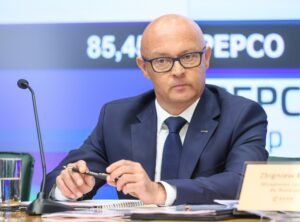In December 2017, a start-up from Sweden presented Uniti One – a small original electric car. The sale of the car is to start in 2019. We talked about how to build a car from scratch within four years and whether the success of a start-up from Lund can be repeated in Polish conditions with Krzysztof Kowalczyk, former president of Electromobility Poland and an electromobility expert.
BiznesAlert.pl: Let us start from the very beginning. What is a start-up?
Krzysztof Kowalczyk: It can be said that a start-up is a new technology company, which can grow very quickly, although in recent years there has been a tendency to call all new companies start-ups.
Should start-up activities involve innovation?
The criterion is rapid growth – the number of users or revenues – and innovation can certainly facilitate this. In the case of electric cars, the mere creation of any prototype or even the production of such a vehicle is no longer innovative – but the true innovation is embedded in the technologies used inside a given vehicle (engine efficiency, batteries, battery and engine management software, sensors, etc.).
Do we have a chance to produce our own electric car?
Yes. It is not confidential knowledge or as Anglo-Saxons say: rocket science. One has to do some standardised work – creation of a a vehicle concept, visual and engineering design, and production preparation. These are standardized activities and in Poland we also have engineering companies that are able to carry out such a process.
The history of Uniti is not old times. The idea to produce an electric car was born in 2015. The company was established in 2016. Before that, the University of Lund had already awarded a grant.
600 thousand kroner (approximately 250 thousand zlotys). What’s interesting is that the University of Lund does not have a share in Uniti or any rights to the intellectual property used in a vehicle, which means that the university acted as a fund to support the riskiest technology projects! In the same year, the sale of shares on the FoundedByMe crowdunding platform was launched and there was a spectacular success. It was one of the largest investment rounds collected in this model. Uniti sold shares worth EUR 1.2 million. EUR 1 million was expected. 570 private investors from 45 countries took part in the financing of the project.
The amount is impressive, but after conversion per person it is less than PLN 9,000 paid by each investor. Given that the construction of a modern car is financed….
The question arises: is this possible to achieve it in Poland? Previous donations show that it is not. In Poland there is still a problem with raising money. If we assume that half of these 570 people came from Sweden, where in Poland could we find 250-300 people who would be ready to invest at such an early stage and without any guarantee of a refund of PLN 10 thousand? A reliable player is the local platform named Beesfund, chosen by the Warsaw Stock Exchange to create a start-up accelerator.
Where to find investors who will not expect anything in return?
There is another question: what if the team does not succeed? The ability to bear business risk and accept failures should be inherent in this type of undertaking.
Polish entrepreneurs are afraid of the stigma of failure. I have seen many times companies artificially kept alive. Development is not present in them, but they only look for ways to prolong agony. This is often the case in family businesses.
As long as the key to the assessment of investment teams by large institutions providing funds for venture capitalinvestments is the return on the investments made, and not whether a (reliably conducted) attempt to create a breakthrough product or service has been made, there will be no real venture funds in Poland.
Maybe we should not be rushing to produce electric cars? Maybe we should stick to what we are really good at, that is, production of components?
Manufacturing own cars, especially from the Polish perspective, is important. Precisely because we are manufacturing components and we are good at doing this, we should also produce cars, a product that crowns the automotive value chain. Today, it is very often not known what part is produced in which country, and which component is from Poland. Having places to work on these individual elements in engineering offices is the first step towards entering a higher level and working on whole vehicles. Even if we achieve production at the level of several thousand units per year, it will be a success allowing us to show the potential of the entire automotive sector in Poland. It is also possible to build test tracks, R&D centres (research and development – editorial note). And we can do it quickly. Uniti is a great example. 2015 – an idea, 2016 – money from the University, 2016 – crowdfunding, 2017 – prototype and looking for financing of the production line, 2017/2018 – construction of the factory and preparation of production and 2019 – launch of sales (in the first year it is planned to produce about 50,000 units).
In 2016, only the cockpit concept was presented. There are at least a few similar stories in Europe: the Croatian Rimac, Czech Luka (where the former Tatra sports project was used).
And will such a car be innovative?
As I have said, innovation lies in components and in making the vehicle so that it is flawless. The fact that an electric car is produced is not innovative, as others are already doing it.
Coming back to the example of Uniti. During the conversation I came to a conclusion that we have many barriers to overcome before the Polish electric car is built.
And I put forward a thesis and good wine (laughs) that we are able to build a Polish electric car within four years. It is enough to simply move away from centralisation and disperse them. For example, let every public technical university in Poland get PLN 1 million to build a prototype of an electric car. Around 20 teams will work on the projects in parallel. Such student prototypes will be used to choose the way to develop production. A lot is happening in technical universities, mechanical parts are created, they only need to be skilfully combined as happens in the example of Student Formula. A small amount and division of risk into many projects – that should work. At the same time, access to university know-how is guaranteed. Only one reservation: if Uniti has succeeded in being transparent at all stages, just as the Czech Luka was an open source project for a long time, it is worth using such a model. This competition should require that the results of the work and the technical documentation be published on an ongoing basis. The requirement of openness will allow students to learn from others’ mistakes. As long as the work is financed by a grant, documentation is open. Only during the commercialization phase, when, as in the case of Uniti, an external company is established, this requirement ceases to apply. But I would like to point out that this must be done in the same way as in Lund: the university provides resources and facilities, expecting nothing in return. It only says: act now!
Interview conducted by Agata Rzędowska








